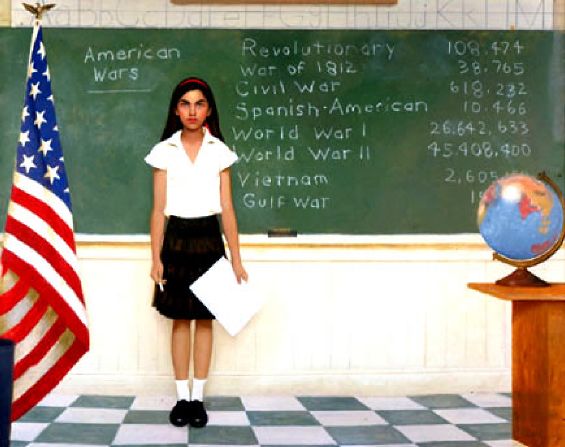As I told the students, the two world wars of the bloody 20th century are still affecting us today. According to the PowerPoint presentation, the "MAIN" causes of WWI were Militarism, Alliances, Imperialism, and Nationalism. There's certainly no shortage of examples of how those paradigms plague us today, and helped lead to the conflict with fundamentalist Islamist militants.
Just like the great powers of Europe, the United States is armed to the teeth, which as history tells us, can be a double-edged sword. As I explained it in terms they could relate to, if you're packing heat on the street, you're more likely to respond to a beef in ways that end up making it worse for all concerned.
Our alliances with monarchs and dictators across the Middle East have led to headaches in every decade since WWII ended, most certainly including this one. Imperialism (which the students had already learned is about securing raw materials and markets) isn't as simple these days as occupying other people's countries, though we still do a bit of that as well. But when there's a boot on your country's neck, you don't particularly care if the boot is made locally; it's the foot inside that counts.
Just like the American colonists did, I said, the people under the boots of the British (or the Ottomans, or the Hapsbugs) wanted their independence. And quite a few still do. So the nationalism of various cultures across the Middle East has made life difficult for the allies we've depended on to keep our supplies of raw materials constant (or relatively so).
But bin Laden himself made the connections more explicit. Even though he wasn't even born yet, he was still upset about the way World War I was settled. As he wrote shortly after the 9/11 attacks:
Following World War I, which ended more than 83 years ago, the whole Islamic world fell under the crusader banner - under the British, French, and Italian governments. They divided the whole world, and Palestine was occupied by the British.
Since then, and for more than 83 years, our brothers, sons, and sisters in Palestine have been badly tortured. Hundreds of thousands of them have been killed, and hundreds of thousands of them have been imprisoned or maimed.Palestine alone wasn't the whole of OBL's list of complaints against the West – he also referenced the civilian toll of the sanctions regime between the two Iraq wars, and the presence of US troops on Saudi soil. But his reference to the Sykes-Picot agreement was a handy hook for our purposes. As I explained it, the British and the French had a knack for drawing borders in such a way that the resulting states were nearly ungovernable without autocratic central governments dependent on a more powerful patron, like, say, Britain or France. Divide and conquer was the strategy, and divide they did.
The borders of Iraq put three rival groups in one "country," and made the Shiites a majority, with the minority Sunnis running the show. The Durand line split the Pashtoon people apart, half in Afghanistan and half in Pakistan, while the rest of Afghanistan was filled up with rival tribes. If this doesn't sound like a recipe for stability, it wasn't meant to be. It was meant as a recipe for domination, and it worked quite well, for a time.
Eventually, of course, the USA replaced the British as the main imperial power in the Middle East, and the rest, as they say, is history.
Of course, the students wanted to know if the death of bin Laden meant that "the war" is over. I had to explain that right now, we're engaged in three separate wars, maybe three and a half if you count Yemen. And that's where the other obvious parallel leaps out: the Hapsburg Empire freaked out and responded to an act of terrorism by attacking an entire country, which led to the Great War to End All Wars. Likewise, the US Empire freaked out and attacked an entire country, which led to the Global War on Terror. And unfortunately, that's exactly what Osama bin Laden hoped we would do.
So this isn't over. It's never over.

No comments:
Post a Comment